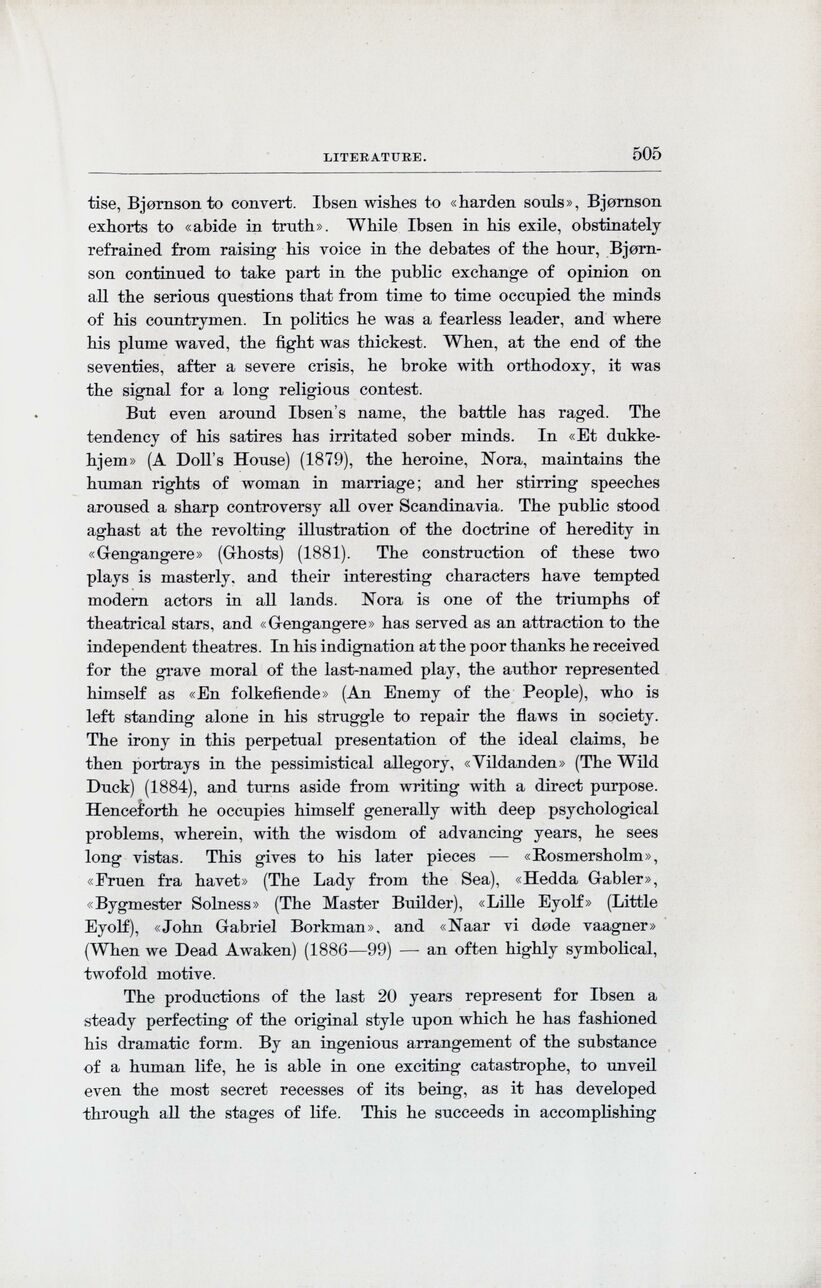
Full resolution (JPEG) - On this page / på denna sida - Literature, by Chr. Brinchmann

<< prev. page << föreg. sida << >> nästa sida >> next page >>
Below is the raw OCR text
from the above scanned image.
Do you see an error? Proofread the page now!
Här nedan syns maskintolkade texten från faksimilbilden ovan.
Ser du något fel? Korrekturläs sidan nu!
This page has been proofread at least once.
(diff)
(history)
Denna sida har korrekturlästs minst en gång.
(skillnad)
(historik)
chastise, Bjørnson to convert. Ibsen wishes to «harden souls», Bjørnson
exhorts to «abide in truth». While Ibsen in his exile, obstinately
refrained from raising his voice in the debates of the hour,
Bjørnson continued to take part in the public exchange of opinion on
all the serious questions that from time to time occupied the minds
of his countrymen. In politics he was a fearless leader, and where
his plume waved, the fight was thickest. When, at the end of the
seventies, after a severe crisis, he broke with orthodoxy, it was
the signal for a long religious contest.
But even around Ibsen’s name, the battle has raged. The
tendency of his satires has irritated sober minds. In «Et
dukkehjem» (A Doll’s House) (1879), the heroine, Nora, maintains the
human rights of woman in marriage; and her stirring speeches
aroused a sharp controversy all over Scandinavia. The public stood
aghast at the revolting illustration of the doctrine of heredity in
«Gengangere» (Ghosts) (1881). The construction of these two
plays is masterly, and their interesting characters have tempted
modern actors in all lands. Nora is one of the triumphs of
theatrical stars, and «Gengangere» has served as an attraction to the
independent theatres. In his indignation at the poor thanks he received
for the grave moral of the last-named play, the author represented
himself as «En folkefiende» (An Enemy of the People), who is
left standing alone in his struggle to repair the flaws in society.
The irony in this perpetual presentation of the ideal claims, he
then portrays in the pessimistical allegory, «Vildanden» (The Wild
Duck) (1884), and turns aside from writing with a direct purpose.
Henceforth he occupies himself generally with deep psychological
problems, wherein, with the wisdom of advancing years, he sees
long vistas. This gives to his later pieces — «Rosmersholm»,
«Fruen fra havet» (The Lady from the Sea), «Hedda Gabler»,
«Bygmester Solness» (The Master Builder), «Lille Eyolf» (Little
Eyolf), «John Gabriel Borkman», and «Naar vi døde vaagner»
(When we Dead Awaken) (1886—99) — an often highly symbolical,
twofold motive.
The productions of the last 20 years represent for Ibsen a
steady perfecting of the original style upon which he has fashioned
his dramatic form. By an ingenious arrangement of the substance
of a human life, he is able in one exciting catastrophe, to unveil
even the most secret recesses of its being, as it has developed
through all the stages of life. This he succeeds in accomplishing
<< prev. page << föreg. sida << >> nästa sida >> next page >>